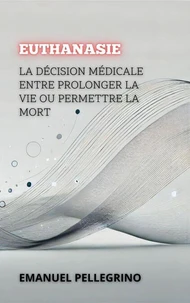Euthanasia: The Medical Decision Between Prolonging Life or Allowing Death. Between Life and Death: The Most Controversial Debates in Medicine
Par :Formats :
Disponible dans votre compte client Decitre ou Furet du Nord dès validation de votre commande. Le format ePub est :
- Compatible avec une lecture sur My Vivlio (smartphone, tablette, ordinateur)
- Compatible avec une lecture sur liseuses Vivlio
- Pour les liseuses autres que Vivlio, vous devez utiliser le logiciel Adobe Digital Edition. Non compatible avec la lecture sur les liseuses Kindle, Remarkable et Sony
 , qui est-ce ?
, qui est-ce ?Notre partenaire de plateforme de lecture numérique où vous retrouverez l'ensemble de vos ebooks gratuitement
Pour en savoir plus sur nos ebooks, consultez notre aide en ligne ici
- FormatePub
- ISBN8230656210
- EAN9798230656210
- Date de parution23/12/2024
- Protection num.pas de protection
- Infos supplémentairesepub
- ÉditeurIndependently Published
Résumé
Euthanasia is one of the most controversial issues in contemporary medicine, involving profound ethical, medical, and psychological dilemmas. This work explores the practice of euthanasia and assisted suicide, challenging medical traditions by questioning the extent to which we have the right to decide the end of our lives. With technological advancements artificially prolonging life, new questions arise about the meaning of a "dignified death" and how far extreme suffering should be alleviated, even if it means shortening life. The book discusses the implications of euthanasia, not only in the context of palliative care, but also its consequences for the role of the doctor and the Hippocratic oath.
Healthcare professionals such as doctors, nurses, and psychiatrists face difficult decisions between prolonging life and relieving patient suffering, bringing to light debates about the patient's autonomy. Real clinical cases and testimonies from professionals, patients, and families enrich the analysis, making the book a deep reflection on the impact of this practice on society. Based on emerging technologies such as artificial intelligence and telemedicine, the work proposes a reflection on the future of euthanasia, weighing whether it will be widely accepted or if it will represent a risk to the value of human life.
This book is essential for those interested in issues of bioethics, right to die, and end-of-life decisions, offering a comprehensive and thought-provoking view on the complex ramifications of this controversial practice.
Healthcare professionals such as doctors, nurses, and psychiatrists face difficult decisions between prolonging life and relieving patient suffering, bringing to light debates about the patient's autonomy. Real clinical cases and testimonies from professionals, patients, and families enrich the analysis, making the book a deep reflection on the impact of this practice on society. Based on emerging technologies such as artificial intelligence and telemedicine, the work proposes a reflection on the future of euthanasia, weighing whether it will be widely accepted or if it will represent a risk to the value of human life.
This book is essential for those interested in issues of bioethics, right to die, and end-of-life decisions, offering a comprehensive and thought-provoking view on the complex ramifications of this controversial practice.
Euthanasia is one of the most controversial issues in contemporary medicine, involving profound ethical, medical, and psychological dilemmas. This work explores the practice of euthanasia and assisted suicide, challenging medical traditions by questioning the extent to which we have the right to decide the end of our lives. With technological advancements artificially prolonging life, new questions arise about the meaning of a "dignified death" and how far extreme suffering should be alleviated, even if it means shortening life. The book discusses the implications of euthanasia, not only in the context of palliative care, but also its consequences for the role of the doctor and the Hippocratic oath.
Healthcare professionals such as doctors, nurses, and psychiatrists face difficult decisions between prolonging life and relieving patient suffering, bringing to light debates about the patient's autonomy. Real clinical cases and testimonies from professionals, patients, and families enrich the analysis, making the book a deep reflection on the impact of this practice on society. Based on emerging technologies such as artificial intelligence and telemedicine, the work proposes a reflection on the future of euthanasia, weighing whether it will be widely accepted or if it will represent a risk to the value of human life.
This book is essential for those interested in issues of bioethics, right to die, and end-of-life decisions, offering a comprehensive and thought-provoking view on the complex ramifications of this controversial practice.
Healthcare professionals such as doctors, nurses, and psychiatrists face difficult decisions between prolonging life and relieving patient suffering, bringing to light debates about the patient's autonomy. Real clinical cases and testimonies from professionals, patients, and families enrich the analysis, making the book a deep reflection on the impact of this practice on society. Based on emerging technologies such as artificial intelligence and telemedicine, the work proposes a reflection on the future of euthanasia, weighing whether it will be widely accepted or if it will represent a risk to the value of human life.
This book is essential for those interested in issues of bioethics, right to die, and end-of-life decisions, offering a comprehensive and thought-provoking view on the complex ramifications of this controversial practice.










